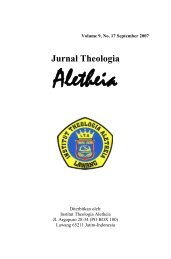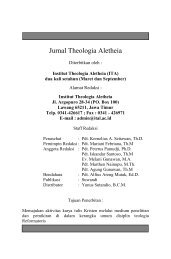download - Sekolah Tinggi Theologia Aletheia Lawang
download - Sekolah Tinggi Theologia Aletheia Lawang
download - Sekolah Tinggi Theologia Aletheia Lawang
You also want an ePaper? Increase the reach of your titles
YUMPU automatically turns print PDFs into web optimized ePapers that Google loves.
69<br />
The law of God is written on every human heart, he<br />
continues. It is our conscience, or<br />
the witness within of what we owe God; it sets before us<br />
good and evil, thus accusing and condemning us, conscious<br />
as we are within ourselves that we have not discharged our<br />
duty, as was fitting. Yet man is swollen with arrogance and<br />
ambition and blinded by self-love. Consequently, he is<br />
unable to see himself and, as it were, to descend into himself,<br />
and confess his misery. Seeing our condition, the Lord has<br />
provided us with a written law to teach us what perfect<br />
righteousness is and how it is to be kept. 75<br />
The written law of God clarifies and reinforces the obedience that<br />
we sinners owe God. It also makes clear how incapable we are of<br />
rendering God this obedience. Here already Calvin calls the<br />
written law ―a mirror‖ in which we see ourselves, knowing<br />
ourselves as religiously and morally scarred and blemished. In this<br />
condition, we also know that we are totally dependent on the love<br />
of our Heavenly Father and Creator shown to us in the sending of<br />
his Son, our Savior, Jesus Christ. Calvin briefly sketches the<br />
saving work of Christ in all its major dimensions. If we embrace<br />
Christ in true faith, we share in his saving benefits. If we do not,<br />
we remain in ruin, confusion, and under judgment.<br />
At this point Calvin launches into an extended exposition of<br />
the decalogue. The first four commandments, or the first table, is<br />
given to ―instruct us in what we owe God,‖ the last six, or the<br />
second table, to ―explain love and the duties of love to be<br />
practiced, for God‘s sake, toward our neighbor.‖ 76 Calvin‘s<br />
emphasis here is on the written law as disclosing our inadequacy to<br />
meet God‘s expectations. Calvin‘s exposition of each<br />
commandment indicates both what is forbidden and what is<br />
75 John Calvin, Institutes of the Christian Religion—1536 Edition, translated and<br />
annotated by Ford Lewis Battles, Grand Rapids: The H.H. Meeter Center for<br />
Calvin Studies and William B. Eerdmans Publishing Company, 1986, pp.16-17.<br />
76 Ibid. pp.18-19.




